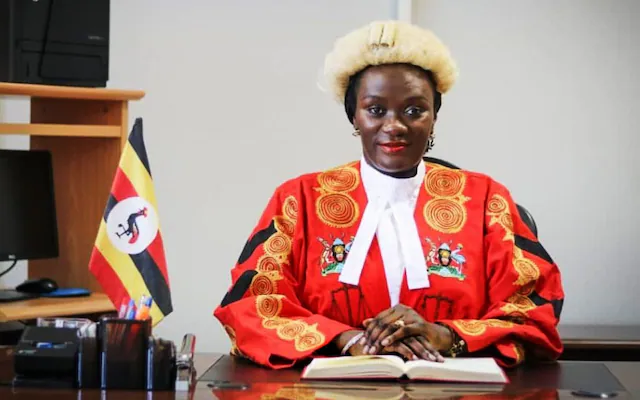A high-ranking Ugandan judge who once served on a United Nations criminal tribunal has been sentenced to more than six years in prison by a British court after being found guilty of modern slavery and immigration offenses involving the forced labor of a young Ugandan woman.
Lydia Mugambe Ssali, 50, was convicted in March at Oxford Crown Court of conspiring to breach immigration law, facilitating travel with intent to exploit, forcing labor, and conspiring to intimidate a witness. She was sentenced Friday to six years and four months in prison and barred from contacting the victim.
Prosecutors said Mugambe used her legal expertise and social status to orchestrate the victim’s illegal entry and then forced her to work without pay as a maid and nanny while Mugambe pursued a doctorate in law at the University of Oxford.
A Scheme Involving Diplomatic Abuse
The victim arrived in the U.K. on a domestic worker visa, which had been arranged by John Mugerwa, then Deputy High Commissioner of the Ugandan Embassy in London. Authorities said the visa was issued under the guise that the woman would work in Mugerwa’s household — a privilege allowed under diplomatic arrangements. However, evidence presented in court showed Mugerwa acted as a proxy for Mugambe, who did not have the legal authority to sponsor such a visa as she was a student.
Prosecutors argued that in return for helping with the visa, Mugambe agreed to assist Mugerwa with an unrelated legal matter in Uganda. The woman’s travel expenses were covered by Mugambe, who picked her up from the airport and immediately put her to work in her home in Kidlington, Oxfordshire.
“She was prevented from earning money, from leaving freely, and from contacting anyone for help,” said prosecutor Caroline Haughey KC, who read the victim’s statement in court. The woman described living “in almost constant fear,” aware of Mugambe’s political and legal connections in Uganda.
She has since been granted asylum in the United Kingdom, citing a credible fear of persecution if she returns.
No Remorse, Says Judge
Sentencing Judge Foxton described the case as “very sad,” noting Mugambe’s long career in human rights law, including her service on the UN roster of criminal tribunal judges and the Ugandan High Court. But he said she showed “absolutely no remorse” and attempted to shift blame onto the victim during proceedings.
Mugambe resigned her UN post following the investigation. Her defense attorney, Paul Raudnitz KC, described her as having had a “glittering legal career” and noted the vocal public support she received outside the courtroom, where several individuals held signs calling for her acquittal.
A Pattern of Abuse Among Elites
Mugambe is among several African nationals recently convicted in the United Kingdom under the Modern Slavery Act, a law enacted in 2015 to combat trafficking and exploitation:
- Ike Ekweremadu, former Nigerian Deputy Senate President, was sentenced in 2023 to over nine years in prison for attempting to traffic a man to the U.K. for organ harvesting on behalf of his ailing daughter.
- Beatrice Ncube and Trust Chiweshe, a Zimbabwean couple, were sentenced in 2021 for forcing a woman into unpaid labor in their Manchester home, using threats and withholding her passport.
- Shekiel Sands, a British national with African heritage, was sentenced in 2022 along with his associates for exploiting children and vulnerable adults in a county lines drug trafficking operation.
Implications for Global Legal Institutions
Mugambe’s case raises difficult questions for international judicial bodies. According to public records, she was appointed to the UN’s judicial roster in May 2023 — three months after Thames Valley Police launched their investigation.
Legal experts say her conviction could undermine trust in international institutions that depend on the moral authority of their officials.
“She embodied the principles of law and human rights — and then turned them upside down for personal gain,” said one legal scholar familiar with the case, who asked not to be named due to ongoing international legal proceedings.
The victim, who remains in protective care, told the court she may never see her family again.

